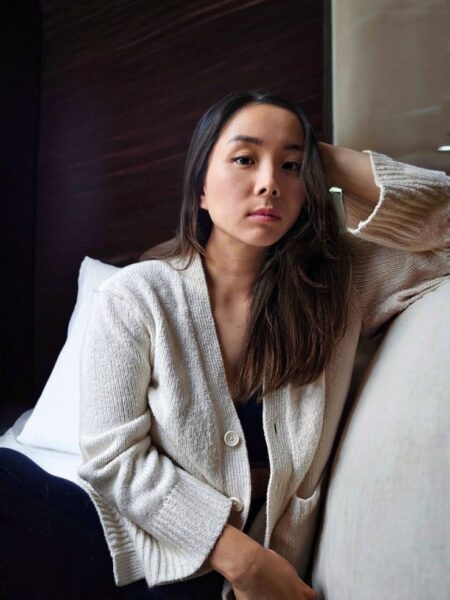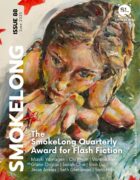Congratulations on winning First Prize in SmokeLong Quarterly Award for Flash Fiction! Tell us about the journey of this piece. How did the initial inspiration arrive? What did the writing process look like? Were there any surprises along the way?
Thank you so much! I am so honored and excited for this story to make its way into the world like this. It was springtime when I wrote this piece, so the flowers around me were abundant. But I had a severe case of hay fever and could hardly smell any of it at all, so I was personally walking through a world without any scent. Briefly, it cleared. I’d get a whiff, and it would just bring me back to a certain place or memory. This story started out as some scribbles in my notebook during this time, with actually what ended up being my first line, “The rain doesn’t smell the same here, and neither do I,” and my last, “I wonder what I smell like to you now.” I often write in fragments, then piece together the story like a puzzle, which is what happened with this one as well. I had to find out what would fit between those two lines and was surprised by the story I found.
One of the themes running through the piece is about language, particularly the ability to name things. On the shadow side of that, there are silences, things that cannot be said. How do you make sense of what’s said in the story and what’s left unsaid?
I was born in Japan but grew up mostly in the United States. I’m fluent in both languages, but every day I don’t use my Japanese, it erodes. Now, when I speak to my parents, living in Japan, I’m sometimes at a literal loss of words and can’t express myself as well as I could in English. Meanwhile, I still have vivid memories from Japan and an intimate connection to being Japanese, which I have an incredibly hard time conveying to my American husband, for example.
Some things just resist language, but there are ways to communicate without words. I tried to explore how this may play out in a relationship—the frustration of misunderstandings, the clumsiness of trying to learn another’s “language,” and the joy of trying and being seen. I didn’t set out intentionally to use the gaps of unsaid things, but I think by the nature of the themes I was addressing and the kind of writing I’m personally drawn to, they took shape organically.
I’m struck by how this piece draws masterfully on the sense of smell. In the story, there is this line: “Memory leaks through scent, through skin.” How did you think about the physicality of memory in this piece? Why is the sense of smell so important for the narrator?
As I was writing this piece, coincidentally, I came across some scientific papers about how scent makes a place and how we “judge” a smell can be influenced by variables like sounds we’re hearing, colors we’re seeing, how warm or cold it is out, etcetera, meaning every person perceives scent slightly differently depending on all these factors. It’s intrinsically tied to us and our perception as individuals.
So now we describe, using our imperfect metaphors and words, attempting to bring smell, memory, and landscapes into consciousness. But as much as you try to translate, how do you communicate to a whole other human about all the memories conjured up by these scents? We’re introducing all these uncertainties of what you smell, what I smell, what you feel and remember—what I do.
It’s almost impossible. In a way, this story is about how lonely it is to be human, as we can never truly understand one another in totality. But it’s also about how we continue to try. That’s what I wanted to show. A narrator who just wants to know and be known by their partner. How she sees the world through scent, speaks through it, and wants her partner to know her own memories as their own, in a way.
Some of the images in the story have a quality of being gentle and violent at the same time such as “yucca spears stabbing skyward” or “claret cups once again bleeding red between the rocks”. How do you see the role of images in a flash story? What’s your process for writing imagery and metaphors?
I’m still very new to the flash form, but I think about how imagery itself can tell the story of a character, of a situation, of a feeling I’m trying to evoke. When I write a story, I often start with these bits first. Images, scenes, emotions—then find the story between them. I’m often drawn to metaphors which not only help paint the scene, but also that you can feel, imagery that can help build something beyond the words on the page itself. I especially love finding these metaphors that might startle and hold contrasting ideas. I’ll also ask myself, is it just pretty or is it doing some work where it is? (Sometimes, it’s just pretty and I keep some of those, too.)
I read in your bio that you work on climate action. In this story the richness of the details about the natural world can be seen as a celebration of the diversity and beauty of nature. What are your thoughts about the role of beauty and the arts in conversations around climate action?
Our natural world is, I’d like to believe, a universal thing we can agree on to love and protect. Now, more than ever, it’s clear that a healthy planet is a human rights issue. Storytelling and art connect us and speak to us on a human, emotional level. It is still the best tool we have for getting humans to care. And we desperately need caring humans.



 In September 2022 SmokeLong launched a workshop environment/community christened SmokeLong Fitness. This community workshop is happening right now on our dedicated workshop site. If you choose to join us, you will work in a small group of around 15-20 participants to give and receive feedback on flash narratives—one new writing task each week.
In September 2022 SmokeLong launched a workshop environment/community christened SmokeLong Fitness. This community workshop is happening right now on our dedicated workshop site. If you choose to join us, you will work in a small group of around 15-20 participants to give and receive feedback on flash narratives—one new writing task each week.